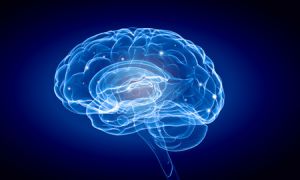[ad_1]
The next time an older person asks you to repeat something you just said, don’t be too quick to assume their hearing is failing.
When someone asks for words to be repeated, or feels like they can hear but not understand speech, the common perception is that their struggle to understand is due to hearing loss. And while that might be the case in some instances, a new study has revealed that the difficulty often lies in the aging brain, and can sometimes occur in cases where no hearing loss exists.

understanding.
In the new study, published in the Journal of Neurophysiology, researchers from the University of Maryland set out to discover why older adults often have difficulty following speech amidst background noise.
In the study, 32 English-speaking subjects who had normal hearing were divided into groups based on age. The group of young adults, with an average age of 22, and the group of older adults, who averaged age 65, were given tests to measure their speech comprehension. They were also given tests to measure both mid-brain and cortical activity. The tests measured the subjects’ ability to understand speech both in quiet settings and settings with background noise (i.e. more than one person talking, as would occur at a cocktail party or in a restaurant).
What the researchers discovered was that the older subjects had more difficulty processing speech, whether in a quiet setting or amid background noise. Electroencephalograms and magnetocephalograms, used to measure mid-brain and cortical activity respectively, also revealed neural deficits in the older study participants.
So what does this mean? It means that essentially, as we age, our brain’s ability to process and understand speech declines. The decline is unrelated to age-related hearing loss and can occur even in the presence of no hearing loss whatsoever.
‘I can hear, but I can’t understand.’
“Often we will hear an older person say, ‘I can hear you, I just can’t understand you,'” Samira Anderson, assistant professor at the University of Maryland Department of Hearing and Speech Sciences, tells Science Daily. “This research gives us new insight into why that is the case.”
The University of Maryland study isn’t the first indication that difficulty understanding speech among older adults might not necessarily be related to hearing. Other studies have pointed to the brain’s involvement in the deterioration of speech understanding as well. Dr. Karen J. Cruikshanks, PhD, professor at University of Wisconsin Madison, is the lead author of ongoing studies that look at the epidemiology of older adults in Beaver Dam, Wisconsin. In one study known as the Beaver Dam Offspring study, of the 2783 participants, 686 participants had normal audiometric thresholds (normal hearing). However, 12 percent of the participants with normal hearing self-reported as having hearing difficulties.
Difficulty understanding speech can lead to sadness, isolation and depression.
Another study looked at the differences between young adults and older adults with regard to their ability to understand words in sentences based on varying degrees of contextual clues, played against ambient noise. As the background speech to noise ratio increased, but the contextual clues decreased, the older subjects experienced more difficulty than the younger subjects understanding the sentences.
“Older people need more time to figure out what a speaker is saying,” said Jonathan Z. Simon, co-author of the University of Maryland study. “They are dedicating more of their resources and exerting more effort than younger adults when they are listening to speech.”
It is important to note that the erosion of brain function when it comes to speech understanding is a normal part of the aging process. But since difficulty understanding speech, regardless of whether it results from hearing loss or not, can lead to sadness, isolation and depression, the hope is that the results of the new study could lead to discoveries that could help older adults better understand speech.
Louder isn’t always better
“The main message is that the older adults in our study have normal hearing as measured on an audiogram, yet they have difficulty understanding speech in noise because the timing aspects of the speech signal are not being accurately encoded,” said Anderson. “Because they have normal hearing, talking louder does not help. So if someone is having trouble understanding you in a noisy restaurant or in a crowded room, it is most important to speak clearly at a normal or slightly slower than normal rate. Your older loved ones will appreciate this courtesy during the upcoming holidays!”
It is important to remember, however, that despite the results of the study, hearing screening is still necessary for those having difficulty understanding speech. Though not all difficulty understanding speech is caused by hearing loss, according to the NIDCD approximately one in three people between the ages of 65 and 74 and nearly half of those older than 75 have difficulty hearing. See a hearing healthcare professional right away if you suspect that you or someone you love has a hearing loss.
[ad_2]
Source link

